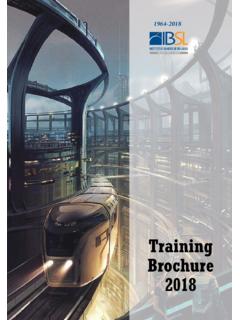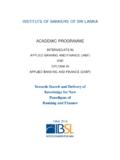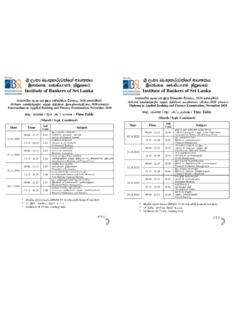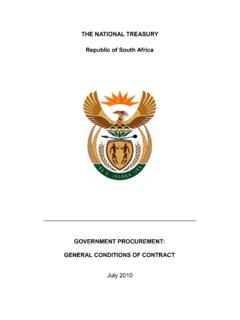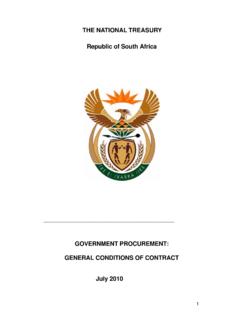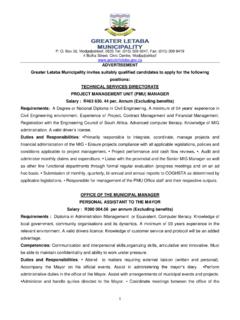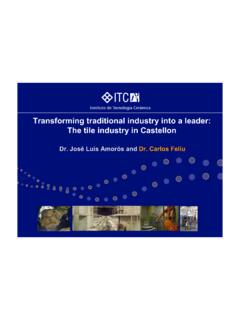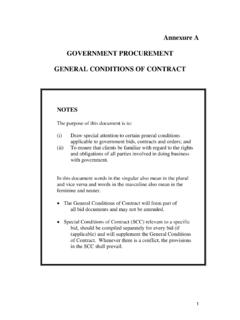Transcription of A Code of Conduct is a set of guidelines which are ...
1 A Code of Conduct is a set of guidelines which are designed to set out acceptable behavior of members of a particular group, Associates or professionals. Many professional organizations make available such a code to handle their services in order to deliver best results. It was a long felt need of the College of Banking and Finance of the IBSL to introduce such a code of ethics for the benefit of both resource persons and students. Having realized the importance of compliance with a code of Conduct by the members of the external faculty of the COBAF, the management of the IBSL has introduced the following Code of Conduct for lecturers of the COBAF, effective from The Code of Professional Conduct for Lecturers at the College of Banking and Finance (COBAF) of the Institute of Bankers of Sri Lanka 1. Objective of the Code a) The Institute of Bankers of Sri Lanka (IBSL) is the official training institute for the banking industry as established under an Act of Parliament, Institute of Bankers of Sri Lanka (Incorporation) Act of 1979.
2 Therefore, the IBSL has to maintain high standards of training to meet the aspirations of the stakeholders in the banking industry to ensure that banking professional are fit and proper persons to operate banks with stability and public confidence. b) All lecturers at COBAF are expected to provide teaching at the COBAF in professional manner in the interest of high training standards to be maintained by the IBSL. c) This professional code of conducts is presented to be mutually beneficial to both lecturers and the COBAF in their professional Conduct . d) Therefore, both the COBAF and lecturers at the COBAF shall conform to provisions of this code. 2. Lecturing Standards a) A greater priority should be given to prepare students for the examinations while technical knowledge is also maintained. b) Lecturing should consist of teaching, discussion of answers for past and model questions, in-class short tests, assignments (reading and writing), etc.
3 C) Student-wise attention should be kept as practicably as possible. d) Power Point presentations or transparent slides should be used to guide the teaching sessions. e) Handouts of reading material in print form should be distributed among the students through arrangements made with the COBAF staff. f) Participation of students should be encouraged through raising questions and answering. g) Current events and examples in the real world relating to subjects should be shared with the students as part of knowledge sharing. h) The tactics used to keep students attentive or amused should be highly ethical. i) The syllabus should be covered in full during the permitted total hours at the end of the semester/term with teaching and reading materials for each topic. j) Lecturers should improve their professional qualifications and practices relating to subjects lectured at the COBAF and inform the Director/COBAF to update the professional profile of lecturers as and when such improvements are made.
4 3. Punctuality a) Regular attendance is necessary. Lecturers should be available in the COBAF at least before 15 minutes of the lecture session and 15 minutes after the lecture session to provide the opportunity for students to meet the lecturers. b) Lecture sessions should be conducted fully during the times allocated. c) Cancellation of classes beyond one lecture session is not permitted. Total cancellation per semester/term should not exceed two sessions. d) In the case the lecturer is unable to Conduct any lecture session, the prior arrangements should be made with another lecturer who is capable of maintaining the teaching standards of the regular lecturer. 4. Evaluation of Lecturers a) One mid semester/term evaluations from the students should be obtained as per the standard form given by the COBAF or a form proposed by the lecturer and agreed by the Director/COBAF.
5 B) The evaluation form of each student should be read by the lecturer same day or next date of class, signed and handed over to the Director COBAF. c) Within a week from the date of evaluation, a summary sheet of evaluation results signed by the Director/COBAF will be handed over to the lecturer and a copy will be submitted to the Chairman through the reporting channel. The evaluation summary of all lecturers will be submitted to the Governing Board for the records and appropriate policy directions that the Board may wish to make. d) The lecturers who get overall evaluation below fair/good in any semester/term should get only one more semester/term to show improvement. e) Summary evaluation may be discussed with the students by the Director/COBAF in class and propose improvements to the lecturer. f) In the courses/classes with the No. of students registered is less than 150, in the event the attendance of students in the class/course declines by more than 25% within two months from the date of commencement of classes/courses, the lecturer s overall performance rating will be affected.
6 G) At the end of each semester/term, the management of the IBSL will have a reception meeting for the lecturers and examiners to share teaching experiences and to discuss improvements to make the IBSL more competitive in the education/training market. h) In the case of CBF and DBF, the overall pass rate of students who regularly attended classes based on the student attendance records at the COBAF of a lecturer should be maintained not be below the overall pass rate of all students who sat the examination for the particular subject. i) In the case of CBF and DBF, lectures overall performance will be evaluated by the management of the IBSL based on the pass rate of students who attended the classes regularly, the overall class attendance level of the students and students evaluation. 5. Integrity of Lecturers towards the IBSL a) Lecturers are expected to promote and contribute to the IBSL s training events.
7 Therefore, they should not own, promote or deliver lectures regular or special at any other institutions including the IBSL s Accredited Centers for any courses that are offered by the COBAF or IBSL. The lecturers who wish to do so or are already engaged in such matters shall terminate their services for the IBSL within a month from the date of implementation of this code. b) In the case of lecturers engaged in work as paper-marking examiners in respect of examinations of CBF and DBF, they should inform the respective Examiner to allocate answer scripts of outstation students to ensure as practicably as possible to avoid marking the answer scripts of students who attended the classes conducted by the lecturer.
